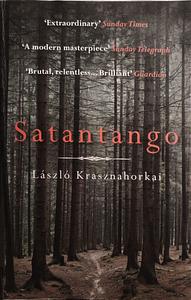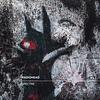Take a photo of a barcode or cover
Het leven is een hel. En de hel dat zijn de anderen. Al helpt het landschap en het weer ook wel in dit boek. Het thema klinkt wellicht niet zo origineel maar zoals het uitgewerkt is, zeker wel. In een regenachtig en koud oosteuropa zit een groep mensen vast in oude gewoontes en op een vergane fabriek. Ze dromen van vertrek, maar dat komt er pas van als een onbetrouwbaar sujet, die zij als de verlosser zien, hen naar verschillende plekken buiten de fabriek stuurt. Dan is er heel wat drank vergoten, ook bij de dokter, die dit hele verhaal verzonnen heeft. Of toch niet?
I hate to reduce things to being “kafkaesque”, but the absurdity and misery captured here (in such neurotic detail) does feel like it’s coming from the same void Kafka was speaking from. Similar to his defining works — the characters of Satantango are hopeless, despairing, but nevertheless still going through the motions and coping in their own strange ways, even if it seems there is no way to outrun their tragic fate.
Krasznahorkai’s style is mesmerizing and oblique; the vision for his overall project is made clear from the first page of his debut novel, and while at times exhausting, the structural tricks at play here prove to be very rewarding once we reach the climax in the bar and all characters have caught up to the same timeline. The way the focus shifts from character to character in that scene, not just glancing but fully diving into the interiority of each, is incredible. The long awaited tango is written intoxicatingly; the winding, rhythmic prose perfectly captures the musicality of song and dance. You really get the feeling that you’re being drunkenly swept off your feet along with the characters.
My only real complaint with this work is that since we know most of the first 6 chapters are all building to the same conclusion (more or less) — the revelation that Irimiás, a potential savior is back in town and possibly back from the dead — the suspense relies almost completely on the characters individual reactions and the way Krasnahorkai leads us there — which is still consistently fascinating, even if some stories (the Etsi Halics bit was a favorite; really heartbreaking) are far more interesting than the others.
Much of the first half is spent disarming you and jumping back and forth in time, slowly dishing out fragments of this story — so it wasn’t until the second act began that I felt I had a real grasp on the direction this was taking; once I did though, there was a much greater sense of urgency and investment in how Irimiás’ “plan” would affect everyone and these sections flew right by. The book is wrapped up beautifully by the end with the reveal of a very clever framing device that both recontextualizes the whole story and perfectly ties it back into the beginning.
Aside from my minor hang-ups in the first half, I really love this work as a whole and believe the form Krasznahorkai tapped into here is genuinely innovative — taking inspiration from the likes of Thomas Bernhard for his extreme stream of consciousness style, while experimenting with his own dance-like structure on a chapter to chapter basis. For as depressing as it is, this is one of the most immersive and entertaining looks at apocalypse, societal collapse and idolatry I’ve ever come across. Really excited to dive into to his later works where he perfected and expanded on this form even more.
4.5/5
Krasznahorkai’s style is mesmerizing and oblique; the vision for his overall project is made clear from the first page of his debut novel, and while at times exhausting, the structural tricks at play here prove to be very rewarding once we reach the climax in the bar and all characters have caught up to the same timeline. The way the focus shifts from character to character in that scene, not just glancing but fully diving into the interiority of each, is incredible. The long awaited tango is written intoxicatingly; the winding, rhythmic prose perfectly captures the musicality of song and dance. You really get the feeling that you’re being drunkenly swept off your feet along with the characters.
My only real complaint with this work is that since we know most of the first 6 chapters are all building to the same conclusion (more or less) — the revelation that Irimiás, a potential savior is back in town and possibly back from the dead — the suspense relies almost completely on the characters individual reactions and the way Krasnahorkai leads us there — which is still consistently fascinating, even if some stories (the Etsi Halics bit was a favorite; really heartbreaking) are far more interesting than the others.
Much of the first half is spent disarming you and jumping back and forth in time, slowly dishing out fragments of this story — so it wasn’t until the second act began that I felt I had a real grasp on the direction this was taking; once I did though, there was a much greater sense of urgency and investment in how Irimiás’ “plan” would affect everyone and these sections flew right by. The book is wrapped up beautifully by the end with the reveal of a very clever framing device that both recontextualizes the whole story and perfectly ties it back into the beginning.
Aside from my minor hang-ups in the first half, I really love this work as a whole and believe the form Krasznahorkai tapped into here is genuinely innovative — taking inspiration from the likes of Thomas Bernhard for his extreme stream of consciousness style, while experimenting with his own dance-like structure on a chapter to chapter basis. For as depressing as it is, this is one of the most immersive and entertaining looks at apocalypse, societal collapse and idolatry I’ve ever come across. Really excited to dive into to his later works where he perfected and expanded on this form even more.
4.5/5
challenging
mysterious
reflective
slow-paced
Plot or Character Driven:
Plot
Strong character development:
No
Loveable characters:
No
Diverse cast of characters:
No
Flaws of characters a main focus:
Yes
slow-paced
Plot or Character Driven:
Character
Strong character development:
No
Loveable characters:
No
Diverse cast of characters:
No
Flaws of characters a main focus:
Yes
challenging
dark
funny
medium-paced
Plot or Character Driven:
A mix
Strong character development:
Complicated
Loveable characters:
No
Diverse cast of characters:
No
Flaws of characters a main focus:
Yes
Too dense, unclear what this is actually about.
challenging
dark
mysterious
slow-paced
Plot or Character Driven:
Plot
Strong character development:
No
Loveable characters:
No
Diverse cast of characters:
Yes
Flaws of characters a main focus:
Complicated
challenging
tense
slow-paced
challenging
dark
sad
slow-paced
Futaki wakes to the sound of bells.
“…and he saw himself nailed to the cross of his own cradle and coffin…eventually, to deliver himself…into the care of the people whose duty it was to wash the corpses…where he was obliged to regard the human condition without a trace of pity…because by then he would know for certain that all his life he had been playing with cheaters who had marked the cards and who would, in the end, strip him even of his last means of defense, of that hope of someday finding his way back home.”
It was raining, the middle of the night, and the occupants of a run-down estate were up and watching, waiting for a sign. And then two men appear out of the fog and offer them a chance to escape.
The doctor looks out the window at the dilapidated buildings of the estate, takes down a notebook and starts to write. He writes,
“…Futaki woke to hear bells.”
“…and he saw himself nailed to the cross of his own cradle and coffin…eventually, to deliver himself…into the care of the people whose duty it was to wash the corpses…where he was obliged to regard the human condition without a trace of pity…because by then he would know for certain that all his life he had been playing with cheaters who had marked the cards and who would, in the end, strip him even of his last means of defense, of that hope of someday finding his way back home.”
It was raining, the middle of the night, and the occupants of a run-down estate were up and watching, waiting for a sign. And then two men appear out of the fog and offer them a chance to escape.
The doctor looks out the window at the dilapidated buildings of the estate, takes down a notebook and starts to write. He writes,
“…Futaki woke to hear bells.”




